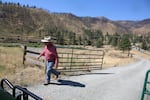Gordon Larson’s world burned in 2015.
His ranch lost timber, livestock and infrastructure. His family’s house narrowly escaped the Canyon Creek Fire. Forty-three other homes in his Eastern Oregon community weren’t so lucky.
More than four years later, Larson’s property shows a resolve to stay: new fences, a new water system and charred stumps in every direction.
“What we love about it is a sense of solitude and a sense of belonging to something bigger than you,” Larson said.

A view from Gordon Larson's ranch, which burned in the 2015 Canyon Creek Fire.
Emily Cureton / OPB
But after all the effort to recover, he and his wife have talked about leaving their home of more than 20 years.
And not because they’re afraid of wildfire.
“The only reason is because we have a group of extremists led by a sheriff,” said the 55-year-old former police officer.
In 2014, Larson retired as an area commander for the Oregon State Police after a 27-year career. He volunteered for 12 years on the Grant County School Board. Last year, he ran for a seat on the county commission, “and I’ve regretted it every day since then because it began this nightmare,” he said.
His opponent was Sam Palmer, younger brother of the most controversial law enforcement official in the region, Grant County Sheriff Glenn Palmer.
Larson lost the election decisively. During the campaign, the sheriff reported Larson for a timber theft that forest managers say never happened, and the sheriff’s supporters challenged his water rights.
Related: Listen: OPB's 'Bundyville' Podcast
It’s not the first time this sheriff stands accused of using the power of his office, and the zeal of his supporters, to target people who criticize his activism. Larson is the latest to have a bitter feud with Palmer in an isolated community, where three out of four voters voted for President Trump in 2016, and many express disdain for state regulations. Heading into the next election, the space for dissent in Grant County has narrowed around its own polarizing figure: a sheriff elected by a few thousand voters, but supported by anti-government groups across the West, known as the Patriot Movement.
Larson said he clashed with this broader political shift to the right. Like Sheriff Palmer, he registers to vote as a Republican.
“But they want to portray me as not a good enough Republican ... or a Democrat,” Larson said.
Palmer denied targeting his former law enforcement colleague.
“I've always considered Gordon a friend. When he retired he did an about face. I don't know what I did, or whether it was the occupation tie-in,” the sheriff said.
‘You Will All Be Judged In Time’
The rivals agree on one thing: 2016 was a turning point. The year opened with anti-government groups taking over the Malheur National Wildlife Refuge in next-door Harney County.
In January, both Larson and Palmer went to a meeting in Grant County where occupation leaders Ammon and Ryan Bundy were invited to speak. Confusion and tension filled a packed room at the John Day senior center as people waited for the Bundys to arrive.

Grant County Sheriff Glenn Palmer stands at a roadblock on Highway 395 near Seneca, Ore., in a 2016 file photo.
Amanda Peacher / OPB
Soon, information trickled in about a confrontation with law enforcement on a snow-covered Highway 60 miles away. Instead of the invited speakers, there were prayers, and an open mic for people to state their grievances, recorded by a reporter with the Blue Mountain Eagle.
Larson was the only person to speak against the refuge occupation.
“The Bundys and this entire group need to go home,” he said. “Maybe some of us feel like we’ve been mistreated by the Forest Service, but by God, we can stand up and do it as neighbors. We don’t need your help.”
That highway confrontation resulted in Oregon State Police officers fatally shooting a member of the Bundys' group. Robert "Lavoy" Finicim became a martyr within the Patriot Movement. Finicum attempted to break through a police roadblock, shouting "I'm going to go meet the sheriff," and "You back down, or you kill me now," before police shot him.
Special deputies appointed by Grant County Sheriff Glenn Palmer later accused Larson of having a role in intercepting the occupation leaders. The retired OSP commander with connections to the FBI was suspicious in the eyes of the Patriot Movement. Even years later, Larson’s name appeared on a list of people accused “for the cold blooded murder of Lavoy.”
“You will all be judged in time and will pay the fiddler,” reads the public Facebook post by Jim Sproul, directed at Larson, among others. Sproul has a close connection to Palmer: He’s spoken on the sheriff’s behalf in news stories, and was appointed by Palmer in 2014 as “public lands patrol,” according to county records.
Sproul protested Larson’s use of irrigation water in June 2018, on the same day as David Traylor, another special deputy once appointed by Palmer.

Gordon Larson watches a stream go by on his Grant County ranch.
Emily Cureton / OPB
In Oregon, affidavits like this can trigger a rarely invoked state regulation to cancel water rights. Basically: use it or lose it. If two people swear you aren't using the water, you can lose your claim to it, unless you prove them wrong.
“It's just shy of $1,000 to have a judge hear our case,” Larson said.
He cut a check to the Oregon Water Resources Department, which will make a decision based on the recommendation of an administrative law judge.
“These processes are designed to provide due process and an impartial review,” according to an email from OWRD spokeswoman Stephanie Prybyl. The agency declined to comment on the specifics of this case.
Larson pointed to supportive testimony from his neighbors and dated photos of lush green fields, taken during the summers he was allegedly not using the irrigation water. In 2018, OWRD’s own staff review of irrigation on the property states non-use wasn’t an issue.
Larson’s hearing has been delayed several times, and in an unusual move, OWRD has closed it to the public “based on security concerns.”
'You Do Not Go After Someone's Water'
Rancher Sharon Livingston believes the tactics used against Larson crossed a sacred line for local politics.
“You do not, in Grant County, go after someone's water,” said Livingston, who used to head the Oregon Cattlemen’s Association and serves on the board of directors for the state’s Department of Agriculture.
She voted for Larson for county commission in 2018 because to her mind, he’s “extremely well qualified to take our voice to Salem, and that’s what we must do.”

Rancher Sharon Livingston said local government meetings can be "somewhat negative and contentious," but that, "I'm not going to disengage from anything because this is my county and I live here."
Emily Cureton / OPB
At 80, she’s spent decades advocating on various boards and committees, and at times her views sound a lot like right-wing talking points: “This state is taxing us to death again. Read the Declaration of Independence.”
She distributes copies of it at local schools. Her own pocket version falls open to a highlighted passage, one of her favorites, about a king sending “swarms of officers to harass our people and eat out their substance.”
Livingston sees the present in grievances white westerners had 250 years ago before they revolted. "I believe that our federal lands have not been managed the way they should be. They're overgrown, they're full of fuel and we are ripe for a fire," she said.
Like many in Grant County, she’s frustrated with outside authority, and she’s also voted for Sheriff Palmer.
'It's Their Loss'
For years, Palmer has opposed the U.S. Forest Service, arguing the federal agency's land management policies create poverty and wildfire. He ended a contract so his deputies would no longer patrol its campgrounds and roads. But in 2018, the sheriff reached out to the agency to accuse Larson, his brother's political opponent, of stealing logs. Palmer said he didn't initiate the report.
“It was given to me and I forwarded it to the Forest Service. It’s a timber issue out of our jurisdiction,” Palmer said.

A view of Grant County Sheriff Glenn Palmer's office window.
Emily Cureton / OPB
It’s unclear who made the initial report, but the U.S. Forest Service put out a press release at the time saying it acted on information from the Grant County Sheriff’s Office and found no evidence of stolen timber. Still, the accusation continued to reverberate. A special deputy appointed by the sheriff in 2015 repeated the allegation to an environmental group, and it spread on social media.
Palmer accused his own political opponent in 2012. In the weeks before an election, the sheriff made a complaint to OSP about Richard Gray, a John Day police officer running against him. Palmer's report claims Gray accessed files at the sheriff's office without permission. State police declined to investigate, "as there was no indication of criminal activity," an OSP spokesman said. Palmer sent a memo to his staff banning Gray from the county jail and sheriff's office. Gray went on to become the John Day chief of police, and years later, he filed an ethics complaint mentioning the incident.
Related: Oregon Justice Department Clears Grant County Sheriff Glenn Palmer
“I ran for Office of Sheriff and during [the] election campaign, Glenn Palmer lied on several occasions accusing me of doing many dishonest things,” Gray said in the complaint.
Ironically, it was Larson, then a state police commander, who Palmer called first to report Gray, according to a report the sheriff later deleted from his own electronic records system.
Inside Palmer’s office, the walls are cluttered with novelty signs. One facing out the window reads: “Guns Are Welcome On Premises … Judicious Marksmanship Is Appreciated.” Above it, a sticker portrays President Obama as a crying baby.
Palmer downplays any official connection between himself and former special deputies like Sproul and Traylor. The sheriff opened a file cabinet and retrieved a handwritten letter of resignation signed by special deputy Jim Sproul, dated July 2016. That's two years before Sproul challenged Larson's water rights, and about three weeks before the Oregonian published an investigation about Palmer's practice of credentialing supporters.

Grant County Sheriff Glenn Palmer holds a letter of resignation from a former special deputy.
Emily Cureton / OPB
Palmer said except for search and rescue, the deputies have resigned or their credentials lapsed.
In 2016, the local manager of 911 services was among those to contact the Oregon Department of Public Safety Standards and Training, with concerns about the special deputies’ access to law enforcement information.
After her complaint, dispatchers who coordinate first responders across a 4,500-square mile area lost access to arrest histories and other records kept by the sheriff’s office.
“There have been many times where officers will ask us about something, and we’ll say, ‘We don’t have access. We can’t look at that,” according to Valerie Maynard, dispatch manager for Grant County Emergency Communications Agency. “Denying us information is not a benefit to the public. It boggles my mind honestly,” she added.

Retired school clerk Judy Schuette keeps a record of Palmer's controversies. After 2016, she asked 911 dispatchers to not to send sheriff's deputies to her home, even in an emergency.
Emily Cureton / OPB
Palmer defended the move in an email: “We have cases that are sensitive and confidential … They are a dispatch center and under our contract should be answering our phones and radios. They are not an investigative agency.”
During the in-person interview, he was dismissive of the complaints DPSST has gotten about him — at least 14 since 2016.
“I know I've got some people out there that don't like me and that's their prerogative. It's their loss,” Palmer said.
Ammon Bundy came to his defense in a 2016 Facebook video, to say the state has no authority over the Grant County sheriff, and to “encourage all people who love to be free to stand with Sheriff Palmer and help defend the people’s power as a republic.”

Grant County Sheriff Glenn Palmer, shown on the right with arms raised above his head, appears in a White House Facebook photo, Sept. 27, 2019.
Facebook/The White House
Palmer has his own history of activism. This year, a lobbying group paid his way to Washington, D.C., to attend events focused on "illegal alien crime." Back in 2012, he accepted a nod for "constitutional sheriff of the year," by a national group that considers sheriffs the "ultimate law enforcement authority in their respective jurisdictions." In 2015, Palmer took it upon himself to draft a natural resources plan for Grant County, deputizing supporters to help write it, and sparking criticism that he overstepped his duties.
“I want a seat at the table,” Palmer reportedly told a skeptical county commission in 2015.
With Larson’s defeat last year, Sheriff Palmer's brother Sam replaced the commissioner who most often clashed with the sheriff.
Sheriff Palmer plans to run for a sixth term in 2020, as he fends off his latest ethics complaint.
‘I Have Become An Extremist’
Larson, the retired state police commander, filed a complaint against Palmer in August, though the roots of their conflict date back years. He first publicly criticized Palmer's leadership during the Malheur occupation. Before that, at the same time the sheriff was becoming the darling of anti-government groups, the state police commander gathered intelligence about them.
“I was part of the Oregon Department of Justice Titan group, which monitored extremism,” Larson said.
Soon after he retired from law enforcement, the Canyon Creek Fire destroyed more private property than any Oregon wildfire in the past 80 years. Resentment rose from the ashes in Grant County, as residents demanded an investigation into the U.S. Forest Service's response.
Larson said he focused on rebuilding from the losses on his ranch.

Gordon Larson on his ranch near Canyon City.
Emily Cureton / OPB
“It’s been slow to heal following the [2015] Canyon Creek Complex Fire,” he told a local reporter in 2018, while he was running for county commissioner against Sam Palmer. “Neighbors no longer wave to neighbors. People view each other through a political prism rather than if they are good neighbors.”
The divisions have taken a toll on Larson. He describes feeling betrayed by the state he once worked for, and he’s taken his own drastic actions to hold it accountable, like secretly taping calls with public officials, “because I don’t trust them.”
After the fire, the occupation, the ongoing feud with Palmer, Larson starts to sound as edgy and paranoid as the type of anti-government activist he might have monitored.
“I have become an extremist against bad cops. I have become an extremist against liars, and I've become an extremist against state agencies that participate in trying to destroy someone's livelihood and take their water,” Larson said.
“At least for the time being, that's me.”

